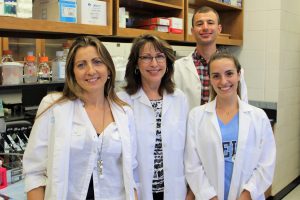Dr. Longobardi’s Lab
Lara, Longobardi, PhD
 Dr. Longobardi’s laboratory research project involves investigating whether the cell signaling by the C-C chemokine receptor 2 (CCR2), which is the receptor for several chemokines, is involved in cartilage and bone degeneration during osteoarthritis (OA) following injury. Trauma is a major risk for OA and nearly half of subjects sustaining significant knee damage will develop injury-induced OA. OA affects over 30 million Americans.
Dr. Longobardi’s laboratory research project involves investigating whether the cell signaling by the C-C chemokine receptor 2 (CCR2), which is the receptor for several chemokines, is involved in cartilage and bone degeneration during osteoarthritis (OA) following injury. Trauma is a major risk for OA and nearly half of subjects sustaining significant knee damage will develop injury-induced OA. OA affects over 30 million Americans.
Articular cartilage and bone are interdependent both mechanically and biologically, but how this cross-talk contributes to the progression of OA is unknown. Dr. Longobardi’s lab uses an in vivo murine model of OA, based on the destabilization of the medial meniscus, to understand whether targeting the CCR2 receptor prevents or delays the pathological changes in articular cartilage and bone induced by OA. She is also performing pain-related behavioral studies to understand the contribution of the CCR2 receptor to pain perception during injury-induced OA.
An additional project in Dr. Longobardi’s lab involves a clinical study in collaboration with Dr. Joanne Jordan at the Thurston Arthritis Research Center. This project focuses on identifying chemokines and cytokines in the serum of subjects with aging OA that are altered during disease progression. The aim of this study is to analyze whether increased serum level of certain chemokines or cytokines may have a prognostic value for OA.
